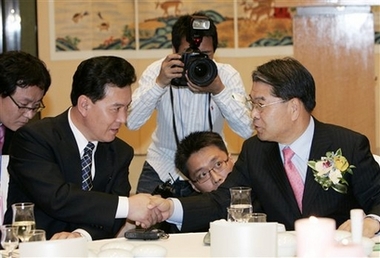Asia-Pacific
S.Korea urges North to shut down reactor
(AP)
Updated: 2007-05-30 14:33
 |
Large Medium Small |
SEOUL, South Korea - South Korea urged the North to shut down its main nuclear reactor and gradually open their heavily armed border to regular train traffic, as the estranged neighbors entered a second day of reconciliation talks Wednesday.
While North Korea had pledged to close its Yongbyon reactor in exchange for economic aid and political concessions, it has yet to fulfill the promise.
US and Chinese diplomats were set to discuss the matter in Beijing on Wednesday, while South Korea pressed on the issue directly to the North in Seoul.
"We stressed the necessity of implementing the agreement quickly," South Korean spokesman Ko Gyoung-bin said after morning talks between the North and South delegations.
South Korea also proposed formally reopening cross-border rail service between the countries in phases, and "in a way that benefits both the South and the North," Ko said.
Earlier this month, the two Koreas held a historic cross-border test train run on restored tracks, marking the first time trains crossed the border since rail links were cut early in the 1950-53 Korean War.
In the morning session, North Korea mentioned neither the nuclear standoff nor the South's recent decision to delay promised rice aid shipments to the North - a potential flash point in the negotiations.
South Korea is delaying shipment of about 400,000 tons of rice, with delivery originally set to begin in late May, over the North's refusal to start dismantling its nuclear programs.
Analysts had expected the rice shipments to be a sticking point and possibly to derail the inter-Korea talks, which are the 21st such meeting and are scheduled to run through Friday.
North Korea scuttled similar talks last year after the South snubbed an earlier demand for rice shipments, citing concerns about the North's missile tests in July 2006. Since then, North Korea has tested its first atomic bomb and is accused of stonewalling on pledges to start dismantling its nuclear programs.
On Wednesday, the North called on the South "to take responsible measures regarding acts that provoke the dialogue partner and endanger South-North relations," Ko said. The admonition referred to regular joint military exercises between the United States and South Korea, drills criticized by the North.
Ko said the North also stressed that inter-Korean issues should not be disrupted by "outside forces" - a common reference to the US, which stations 28,000 troops in South Korea as a legacy of the Korean War.
North Korea has been refusing to shut down its reactor until it receives funds from an account at a bank in Macau. The account was frozen when the US blacklisted the bank in 2005.
North Korea's $25 million at Macau's Banco Delta Asia was freed earlier this year, but Pyongyang has not withdrawn the money, apparently seeking to receive it through a bank wire transfer to prove the funds are now clean. The US had alleged the funds were tied to money laundering and counterfeiting.
The chief US negotiator to North Korean nuclear talks arrived in China on Wednesday to discuss new ways to resolve the long-running banking dispute. Any breakthrough could help smooth inter-Korean talks in Seoul.
Christopher Hill told reporters in Indonesia on Tuesday the process would be "helped immeasurably" if North Korea began dismantling its nuclear reactor as agreed to with the United States and four other countries.
| 分享按钮 |

